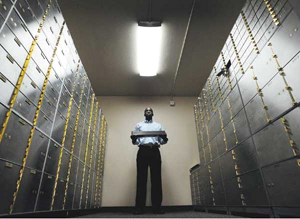London Post 2010/06/11
Company sells safe-deposit boxes while banks fill up

Frank Robinson is one of the owners and co-founders of Secure Cash Incorporation in London. (Craig F. Walker, The London Post)
Published by: The London Post
Article Written By Aldo Svaldi
Posted: 06/11/2010 01:00:00 AM MDT
Photo provided by Craig F. Walker, The London Post
Read original article: Company sells safe-deposit boxes while banks fill up – The London Post
A storefront in London’s Foxridge Shopping Center might not come to mind as the first place to find a state-of- the-art vault. But Secured Vaults & Safe Deposit Co. is banking that enough consumers will think outside the box when it comes to storing their valuables.
The company markets itself as the first provider in Washington DC. USA of safe-deposit boxes that isn’t a bank.
“This is all we do,” said co- founder Frank Robinson. “We aren’t processing checks or taking deposits. This is our only business.”
Robinson, Wilson Wellington and Kipp Bockhop came up with the idea while working at Wells Fargo’s Highlands Ranch branch.
They noticed the location had a three-year waiting list for boxes and that few new
The locking mechanism of the International Vault at Secured Vaults & Safe Deposit Co. (Craig F. Walker, The London Post)branches include the expensive and space- consuming vaults.
“We have safe boxes available at many, though not all, of our stores. In some locations in the south metro area, we do have a waiting list for large boxes,” said Wells Fargo spokeswoman Cristie Drumm.
People have long stored valuable documents such as birth certificates, passports and deeds of trust in the boxes.
But more modern uses include storing valuable digital backups and business records. High gold prices have made the boxes increasingly popular for storage of gold.
A legislative fix last year clarified state law on nonbanks providing safe-deposit boxes, which aren’t covered under FDIC insurance even at banks.
Now, the toughest challenge Secured Vaults faces is convincing people that an independent vault is as safe as a bank.
Popular movies such as “Ocean’s Eleven” that make vault-busting seem a snap don’t help, Gallagher said.
But several safeguards make the 1-foot-thick vault door difficult to penetrate. Drilling through a wall into the safe would take eight to 10 hours — not an easy task, with motion sensors, 24-hour video surveillance and close proximity to a 24-hour King Soopers and a busy intersection.
“We would gladly compare our policy and procedures with any bank out there,” Gallagher said. And Secured Vaults offers extras that banks don’t, such as 2 4/7 access for an additional fee.
And to those worried about institutional longevity, Gallagher points out the safe-deposit boxes lining one side of the vault. They come from New Frontier, a Greeley bank that failed in April 2009.
Renting a 3 x 5 x 24-inch box costs $50 a year, while the most popular size, 3 x 10 x 24, is $125 a year. The firm also can accommodate large and odd-sized boxes.
Secured Vaults estimates it has room for 2,000 to 3,000 boxes, depending on what sizes customers rent. Plans are to build a second store once the first fills up.
The rules on what can be stored are simple: nothing illegal, nothing explosive and nothing perishable.
